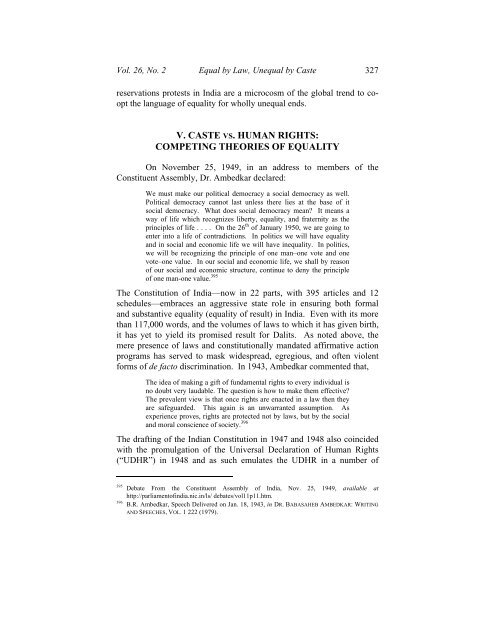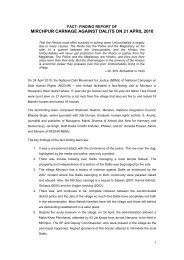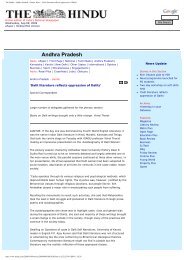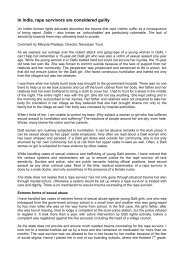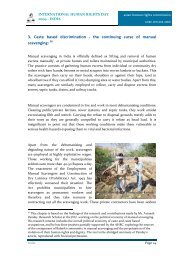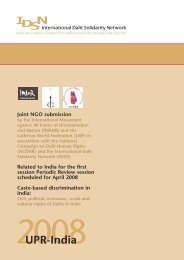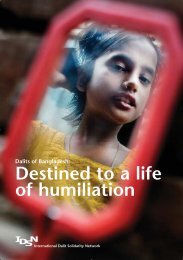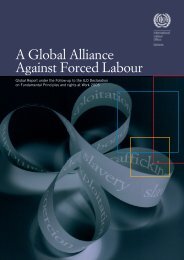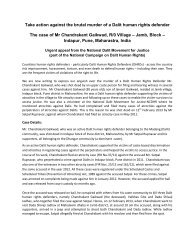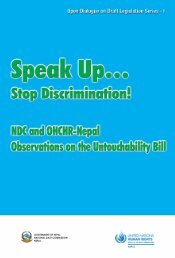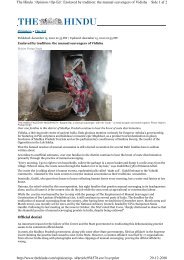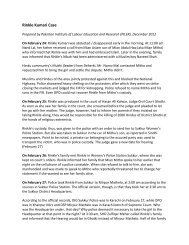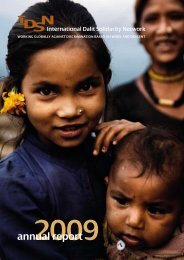326 Wisconsin <strong>International</strong> Law Journaleconomically backward classes,” adding that the use of data that is eitherobsolete or based entirely on <strong>caste</strong> statistics further perpetuates the <strong>caste</strong>system. 388 A related contention involves the scope of Article 15(5) andwhether allowing for reservations in institutions of higher educationabandons the significance of merit altogether, adding that suchreservations in specialty institutions had been struck down <strong>by</strong> theSupreme Court in earlier decisions. 389 Finally, the petitioners haveargued that the current Act does not take into account the concept ofexcluding the “creamy layer” from the reservations policy. 390While the category at issue is that of OBCs, the issue of whether<strong>Dalit</strong> candidates should also be subjected to the “creamy layer” test hasnow entered the fray. 391 Moreover, the public discourse and ensuingprotests have conflated the <strong>Dalit</strong> and OBC categories in the symbols usedto decry the Amendment and the Act. In the spring of 2006, for instance,thousands of students across the country went on strike to protest theexpansion of reservations in higher education. 392 Under the banner of“Youth for Equality,” “[m]edical students in Delhi, dressed in their whitecoats, took up brooms and swept the streets to suggest that they willbecome untouchable ‘sweepers’ if the policies are implemented.” 393Students at the All India Institute of Medical Sciences also burned copiesof Dr. Ambedkar’s books in protest, videotaped the incident, andcirculated the video on campus as a means of intimidating <strong>Dalit</strong> studentswho were no strangers to name-calling, abuse, and harassment. 394Oblivious to the irony of degrading <strong>Dalit</strong>s as sweepers whilesimultaneously marching under an <strong>equal</strong>ity banner, or burning the booksof the author of the constitution whose <strong>equal</strong>ity language now buttressestheir fight—an act no less horrific for <strong>Dalit</strong>s than the burning of crossesin front of African-American homes <strong>by</strong> the Klu Klux Klan—the anti-388 Quota Law Has to Pass the Test of Rationality, INDIAN EXPRESS, Oct. 11, 2007, available athttp://www.indianexpress.com/story/227020.html (last visited Aug. 16, 2008).389 (2006) 143 S.C.R. 265.390 Id.391 See Debashis Pal, Reservation for Creamy Layer?, HINDU BUSINESS LINE, May 12, 2006. Onthe controversy as to whether a Supreme Court judgment last year introduced a “creamy layer”exclusion into public sector employment reservations for scheduled <strong>caste</strong>s and scheduled tribes,see V. Venkatesan, Ambiguous Verdict, 22 FRONTLINE, Nov. 4-17, 2006, at 32; J. Venkatesan,Verdict Does Not Relate to Creamy Layer Among SCs, STs: Banerjee, HINDU, Nov. 24, 2006.392 Laura Dudley Jenkins, Caste, Community, and Reservations, (Working Paper, 2007) (on filewith author).393 Id.394 See Ajay Kumar Singh, “Even if I Never Become a Doctor, I Will Not Give Up This Fight,”TEHELKA, Jun. 2, 2007, available at http://www.tehelka.com/story_main30.asp?filename=hub020607Personal_histories.asp (last visited Aug. 16, 2008).
Vol. 26, No. 2 Equal <strong>by</strong> Law, Un<strong>equal</strong> <strong>by</strong> Caste 327reservations protests in India are a microcosm of the global trend to cooptthe language of <strong>equal</strong>ity for wholly un<strong>equal</strong> ends.V. CASTE VS. HUMAN RIGHTS:COMPETING THEORIES OF EQUALITYOn November 25, 1949, in an address to members of theConstituent Assembly, Dr. Ambedkar declared:We must make our political democracy a social democracy as well.Political democracy cannot last unless there lies at the base of itsocial democracy. What does social democracy mean? It means away of life which recognizes liberty, <strong>equal</strong>ity, and fraternity as theprinciples of life . . . . On the 26 th of January 1950, we are going toenter into a life of contradictions. In politics we will have <strong>equal</strong>ityand in social and economic life we will have in<strong>equal</strong>ity. In politics,we will be recognizing the principle of one man–one vote and onevote–one value. In our social and economic life, we shall <strong>by</strong> reasonof our social and economic structure, continue to deny the principleof one man-one value. 395The Constitution of India—now in 22 parts, with 395 articles and 12schedules—embraces an aggressive state role in ensuring both formaland substantive <strong>equal</strong>ity (<strong>equal</strong>ity of result) in India. Even with its morethan 117,000 words, and the volumes of <strong>law</strong>s to which it has given birth,it has yet to yield its promised result for <strong>Dalit</strong>s. As noted above, themere presence of <strong>law</strong>s and constitutionally mandated affirmative actionprograms has served to mask widespread, egregious, and often violentforms of de facto discrimination. In 1943, Ambedkar commented that,The idea of making a gift of fundamental rights to every individual isno doubt very laudable. The question is how to make them effective?The prevalent view is that once rights are enacted in a <strong>law</strong> then theyare safeguarded. This again is an unwarranted assumption. Asexperience proves, rights are protected not <strong>by</strong> <strong>law</strong>s, but <strong>by</strong> the socialand moral conscience of society. 396The drafting of the Indian Constitution in 1947 and 1948 also coincidedwith the promulgation of the Universal Declaration of Human Rights(“UDHR”) in 1948 and as such emulates the UDHR in a number of395 Debate From the Constituent Assembly of India, Nov. 25, 1949, available athttp://parliamentofindia.nic.in/ls/ debates/vol11p11.htm.396 B.R. Ambedkar, Speech Delivered on Jan. 18, 1943, in DR. BABASAHEB AMBEDKAR: WRITINGAND SPEECHES, VOL. 1 222 (1979).
- Page 1 and 2:
EQUAL BY LAW, UNEQUAL BY CASTE: THE
- Page 3 and 4:
Vol. 26, No. 2 Equal by Law, Unequa
- Page 5 and 6:
Vol. 26, No. 2 Equal by Law, Unequa
- Page 7 and 8:
Vol. 26, No. 2 Equal by Law, Unequa
- Page 9 and 10:
Vol. 26, No. 2 Equal by Law, Unequa
- Page 11 and 12:
Vol. 26, No. 2 Equal by Law, Unequa
- Page 13 and 14:
Vol. 26, No. 2 Equal by Law, Unequa
- Page 15 and 16:
Vol. 26, No. 2 Equal by Law, Unequa
- Page 17 and 18:
Vol. 26, No. 2 Equal by Law, Unequa
- Page 19 and 20:
Vol. 26, No. 2 Equal by Law, Unequa
- Page 21 and 22: Vol. 26, No. 2 Equal by Law, Unequa
- Page 23 and 24: Vol. 26, No. 2 Equal by Law, Unequa
- Page 25 and 26: Vol. 26, No. 2 Equal by Law, Unequa
- Page 27 and 28: Vol. 26, No. 2 Equal by Law, Unequa
- Page 29 and 30: Vol. 26, No. 2 Equal by Law, Unequa
- Page 31 and 32: Vol. 26, No. 2 Equal by Law, Unequa
- Page 33 and 34: Vol. 26, No. 2 Equal by Law, Unequa
- Page 35 and 36: Vol. 26, No. 2 Equal by Law, Unequa
- Page 37 and 38: Vol. 26, No. 2 Equal by Law, Unequa
- Page 39 and 40: Vol. 26, No. 2 Equal by Law, Unequa
- Page 41 and 42: Vol. 26, No. 2 Equal by Law, Unequa
- Page 43 and 44: Vol. 26, No. 2 Equal by Law, Unequa
- Page 45 and 46: Vol. 26, No. 2 Equal by Law, Unequa
- Page 47 and 48: Vol. 26, No. 2 Equal by Law, Unequa
- Page 49 and 50: Vol. 26, No. 2 Equal by Law, Unequa
- Page 51 and 52: Vol. 26, No. 2 Equal by Law, Unequa
- Page 53 and 54: Vol. 26, No. 2 Equal by Law, Unequa
- Page 55: Vol. 26, No. 2 Equal by Law, Unequa
- Page 58 and 59: 312 Wisconsin International Law Jou
- Page 60 and 61: 314 Wisconsin International Law Jou
- Page 62 and 63: 316 Wisconsin International Law Jou
- Page 64 and 65: 318 Wisconsin International Law Jou
- Page 66 and 67: 320 Wisconsin International Law Jou
- Page 68 and 69: 322 Wisconsin International Law Jou
- Page 70 and 71: 324 Wisconsin International Law Jou
- Page 74 and 75: 328 Wisconsin International Law Jou
- Page 76 and 77: 330 Wisconsin International Law Jou
- Page 78 and 79: 332 Wisconsin International Law Jou
- Page 80 and 81: 334 Wisconsin International Law Jou
- Page 82 and 83: 336 Wisconsin International Law Jou
- Page 84 and 85: 338 Wisconsin International Law Jou
- Page 86 and 87: 340 Wisconsin International Law Jou
- Page 88 and 89: 342 Wisconsin International Law Jou


